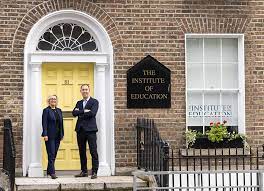Institute of Education – Shaping the Future of Education
The Institute of Education is a renowned educational institution dedicated to excellence in teaching, research, and the advancement of knowledge in the field of education. With a rich history spanning several decades, we have established ourselves as a leading authority in shaping the future of education.
Our Mission
At the Institute of Education, our mission is to empower individuals with the knowledge, skills, and values necessary to transform education systems and make a positive impact on society. We strive to cultivate innovative thinking, promote inclusive practices, and foster lifelong learning.
Academic Programs
We offer a diverse range of academic programs that cater to aspiring educators, researchers, administrators, and policymakers. Our comprehensive curriculum combines theoretical frameworks with practical experiences to equip our students with a deep understanding of educational principles and best practices.
From undergraduate degrees in education to specialized graduate programs and doctoral studies, our courses are designed to meet the evolving needs of today’s educational landscape. Our faculty comprises experienced educators and scholars who are committed to providing high-quality instruction and mentorship.
Research Excellence
The Institute of Education is at the forefront of educational research, driving innovation and influencing policy decisions. Our distinguished researchers collaborate on projects that address critical challenges in education across various domains such as curriculum development, assessment methods, technology integration, teacher training, and more.
Through our research initiatives, we aim to generate evidence-based knowledge that informs educational practices and contributes to the improvement of teaching and learning outcomes. We actively engage with local communities, schools, and organizations to ensure our research findings have a meaningful impact on educational policies and practices.
Community Engagement
As an institution deeply committed to community engagement, we actively collaborate with schools, educational organizations, and policymakers to create positive change in the education sector. We offer professional development programs for teachers, workshops for parents, and seminars for education stakeholders.
Our commitment extends beyond the classroom as we strive to address societal issues through educational initiatives. By partnering with community organizations, we aim to bridge educational gaps, promote social inclusion, and empower individuals from all backgrounds through education.
Institute of Education – Shaping the Future
The Institute of Education remains dedicated to its vision of shaping the future of education. Through our academic programs, research endeavors, and community engagement initiatives, we aspire to create a transformative impact on individuals’ lives and society as a whole.
Understanding Institutes in Education: Definitions, Purposes, and Differences Between Colleges and Schools
- What is an institute in education?
- What is the purpose of the Institute of Education Sciences?
- Is an institution a college?
- Is an institute a school?
What is an institute in education?
An institute in education refers to an educational institution that focuses on the study, research, and advancement of knowledge in the field of education. It is a specialized organization dedicated to providing academic programs, conducting research, and offering professional development opportunities for educators, administrators, policymakers, and other stakeholders in the education sector. Institutes of education play a crucial role in shaping the future of education by equipping individuals with the necessary skills, knowledge, and expertise to improve teaching practices, develop innovative educational approaches, and address the evolving needs of learners. These institutes often offer a wide range of courses and programs designed to enhance understanding and application of educational theories, methodologies, and best practices. By fostering collaboration among educators and researchers, institutes in education contribute to the continuous improvement of educational systems and help create positive change within the field.
What is the purpose of the Institute of Education Sciences?
The purpose of the Institute of Education Sciences (IES) is to advance education research, evaluation, and statistics to provide policymakers, educators, and the public with reliable evidence-based information. As a branch of the U.S. Department of Education, IES conducts rigorous research studies, develops educational resources and tools, and disseminates valuable findings to improve educational practices and policies. By promoting high-quality research and data-driven decision-making, IES aims to enhance student outcomes, address educational disparities, and contribute to the continuous improvement of the education system in the United States.
Is an institution a college?
When considering the question, “Is an institution a college?” it is important to clarify the distinction between these terms. While an institution can refer to any established organization or establishment, a college specifically refers to a type of educational institution that offers undergraduate and sometimes postgraduate degrees. However, it’s worth noting that not all institutions are colleges. Institutions can encompass various other types of organizations such as universities, research institutes, vocational schools, or even non-educational establishments like hospitals or government agencies. Therefore, while a college is a specific type of institution, not all institutions are colleges.
Is an institute a school?
The term “institute” is often used interchangeably with “school,” but there are some subtle differences between the two. While both institutes and schools are educational institutions, an institute typically refers to a specialized organization that focuses on a specific field of study or research. Institutes often offer advanced or specialized courses and programs beyond what traditional schools offer. They may also have a stronger emphasis on research and academic exploration. However, it’s important to note that the specific usage of these terms can vary depending on regional or cultural contexts, so it’s always best to refer to the specific institution’s description and offerings to understand its nature accurately.

